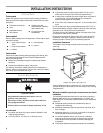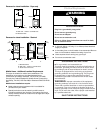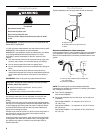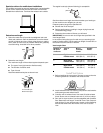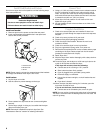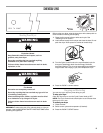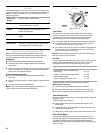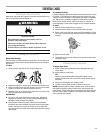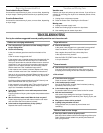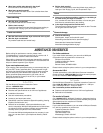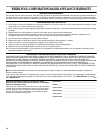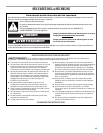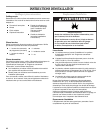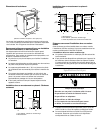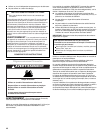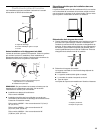
12
Removing Accumulated Lint
From Inside the Dryer Cabinet
Lint should be removed every 2 years, or more often, depending
on dryer usage. Cleaning should be done by a qualified person.
From the Exhaust Vent
Lint should be removed every 2 years, or more often, depending
on dryer usage.
Vacation and Moving Care
Vacation care
Operate your dryer only when you are at home. If you will be on
vacation or not using your dryer for an extended period of time,
you should:
1. Unplug dryer or disconnect power.
2. Clean lint screen. See “Cleaning the Lint Screen.”
Moving care
1. Unplug the power supply cord.
2. Make sure leveling legs are secure in dryer base.
3. Use masking tape to secure dryer door.
TROUBLESHOOTING
First try the solutions suggested here and possibly avoid the cost of a service call...
Clothes are not drying satisfactorily
■ The compact dryer operates at a lower wattage. Expect
longer drying times.
■ Check the following:
Is the wire exhaust guard removed from the back of the
dryer?
Is the lint screen clogged with lint?
Is the exhaust vent or outside exhaust hood clogged with lint,
restricting air movement? Run the dryer for 5-10 minutes.
Hold your hand under the outside exhaust hood to check air
movement. If you do not feel air movement, clean exhaust
system of lint or replace exhaust vent with heavy metal or
flexible metal vent. See “Installation Instructions.”
Is the exhaust vent crushed or kinked? Replace with heavy
metal or flexible metal vent. See “Installation Instructions.”
Has an air dry cycle been selected? Select the right cycle for
the types of garments being dried. See “Drying, Cycle, and
Temperature Tips.”
Are fabric softener sheets blocking the grille? Use only one
fabric softener sheet and only use it once.
Is the automatic cycle ending early? This cycle will end early
if dryer load is not contacting the sensor strips. Level the
dryer. See “Installation Instructions.”
■ Is the dryer located in a room with temperature below
45ºF (7ºC)?
Proper operation of dryer cycles requires temperatures above
45ºF (7ºC).
■ Was a cold rinse water used? Was the load very wet?
Expect longer drying times with items rinsed in cold water
and with items that hold moisture (cottons).
■ Is the load too large and heavy to dry quickly?
Separate the load to tumble freely.
Dryer will not run
■ Check the following:
Is the power cord plugged into a grounded 3 prong outlet?
Has a fuse blown, or has a circuit breaker tripped?
Was a regular fuse used? Use a time-delay fuse.
Is the dryer door firmly closed?
Was the PUSH TO START button firmly pressed?
Is a cycle selected?
Unusual sounds
■ Has the dryer had a period of non-use?
If the dryer hasn’t been used for a while, there may be a
thumping sound during the first few minutes of operation.
Lint on load
■ Is the lint screen clogged?
Clean lint screen. Check for air movement.
■ Is the load properly sorted?
Sort lint givers (towels, chenille) from lint takers (corduroy,
synthetics). Also sort by color.
■ Is the load too big or too heavy?
Dry smaller loads so lint can be carried to the lint screen.
■ Was the load overdried?
Use correct dryer settings for load type. Overdrying can
cause lint-attracting static electricity. See “Drying, Cycle, and
Temperature Tips.”
■ Was paper or tissue left in pockets?
■ Is pilling being mistaken for lint?
Pilling (surface fuzz) is caused by normal wear and
laundering.
Stains on load or color change
■ Was dryer fabric softener properly used?
Add dryer fabric softener sheets at the beginning of the cycle.
Fabric softener sheets added to a partially dried load can
stain your garments.



